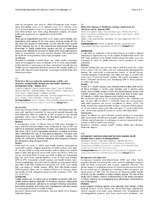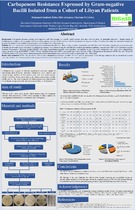| dc.contributor.author | Shallouf, Mohamed | |
| dc.contributor.author | Abrantes, Pedro Miguel dos Santos | |
| dc.contributor.author | Africa, Charlene W.J. | |
| dc.date.accessioned | 2017-01-12T07:09:13Z | |
| dc.date.available | 2017-01-12T07:09:13Z | |
| dc.date.issued | 2016 | |
| dc.identifier.citation | Shallouf, M., Abrantes, P.D.M.S., Africa, C.W.J. (2016). Carbapenem resistance expressed by Gram-negative bacilli
isolated from a cohort of Libyan patients. Antimicrob Resist Infect Control 2016, 6(Suppl 1):A10 | en_US |
| dc.identifier.issn | 2047-2994 | |
| dc.identifier.other | DOI: 10.1186/s13756-016-0153-0 | |
| dc.identifier.uri | http://hdl.handle.net/10566/2483 | |
| dc.description.abstract | Background and objectives: Carbapenem-resistant Enterobacteriaceae (CRE) and other Gram-negative bacteria are among the most common pathogens responsible for both community and hospital acquired infection. The global spread of cephalosporinases in Enterobacteriaceae has led to the increased use of carbapenems resulting in the emergence and rapid spread of CRE. This has become an alarming public health
concern, yet the condition in Libya remains unclear. The aim of this study was to obtain a better understanding of CRE strains prevalent
in Libyan patients by investigating their phenotypic characteristics and antibiograms.
Methods: Gram-negative bacterial species were collected from Misrata Central Hospital, Misrata Cancer Centre and Privet Pathology Laboratories. Clinical samples and swabs were obtained from hospitalised and non-hospitalised patients and from mechanical ventilation and suction machines. Patients who had received antibiotic therapy for at least three days prior to the study were excluded. The identification and characterization of the isolated species were achieved using the growth characteristics on MacConkey and blood agar,
spot tests and API 20E or API 20NE biochemical testing systems. Screening for carbapenem resistance was performed using the disk
diffusion method with carbapenem 10 μg and cephalosporin 30 μg disks and minimum inhibitory concentrations (MIC) determined
using the Sensititre Gram-negative Xtra plate format (GNX2F). All strains demonstrating resistance or reduced susceptibility to one of
the four carbapenems were subjected to carbapenememase activity detection using the RAPIDEC CARBA NP test, Modified Hodge test
and carbapenem inactivation methods.
Results: A total of one hundred and forty isolates representing fourteen bacterial species were isolated from 140 non-duplicated specimens.
Clinical specimens included urine samples (96/140, 68.57%), sputum (15/140, 10.71%), surgical wound swabs (18/140, 12.85%),
foot swabs from diabetes mellitus (DM) patients (6/140, 4.29%), ear swabs (3/140, 2.14%) and wound swabs (2/140, 1.43%). Thirty-four
(24.29%) isolates demonstrated resistance to at least one of the four carbapenems with Klebsiella pneumoniae representing 73.53%
(25 isolates) of all carbapenem resistant species, followed by 8.82% for Pseudomonas aeruginosa (3 isolates), 5.88% for both Proteus
mirabilis (2 isolates) and Escherichia coli (2 isolates) and 2.94% for both Citrobacter koseri (1 isolate) and Rahnella aquatilis (1 isolate).
The other isolates were either susceptible or cephalosporinase producers.
Conclusion: This study has revealed the high rate of carbapenem resistance amongst Libyan patients and emphasizes the crucial need for accurate screening, identification and susceptibility testing to prevent further spread of nosocomial and community acquired resistance.
This may be achieved through the establishment of antibiotic stewardship programmes along with firm infection control practices. | en_US |
| dc.description.sponsorship | National Research Foundation of South Africa;
Libyan Government | en_US |
| dc.language.iso | en | en_US |
| dc.publisher | BioMed Central | en_US |
| dc.relation.ispartofseries | 6th Infection Control Africa Network Congress Abstracts;A10 | |
| dc.rights | Copyright the Authors, who have granted to any third party, in advance and in perpetuity, the right to use, reproduce or disseminate the article, according to the BioMed Central license agreement. | |
| dc.subject | Drug resistance | en_US |
| dc.subject | Bacteriology | en_US |
| dc.title | Carbapenem resistance expressed by Gram-negative bacilli isolated from a cohort of Libyan patients | en_US |
| dc.type | Presentation | en_US |
| dc.description.accreditation | Web of Science | |


